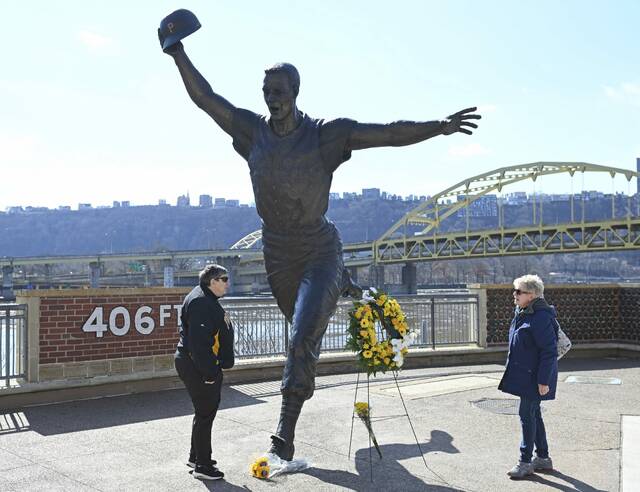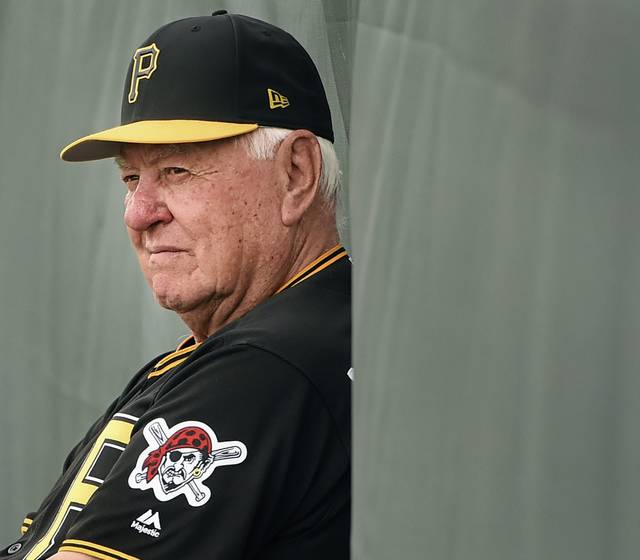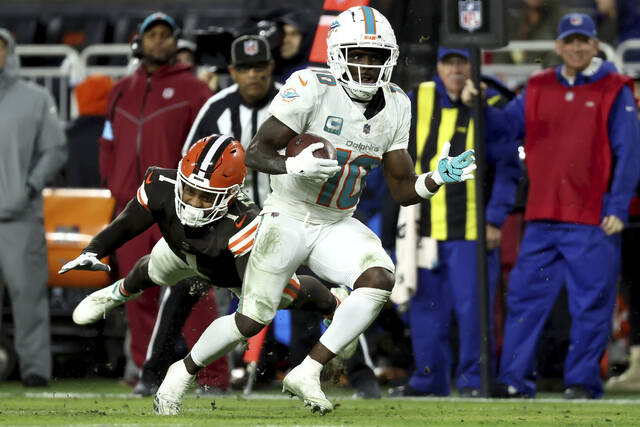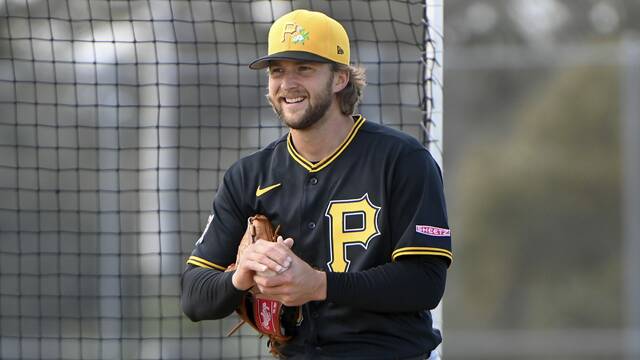Nostalgia is a powerful emotion. For many, two things are frequent triggers of that warm sense of yearning for days gone by.
Baseball and movies.
It’s even better when the subject matter at hand is about one of the more likable personalities the game has known.
Those two pastimes intersect this week at Downtown Pittsburgh’s beautifully old-school Harris Theater. The documentary “It Ain’t Over” will debut at 5:30 p.m. Friday. The film tells the story of Lawrence “Yogi” Berra’s life and legendary career with the New York Yankees.
And there’s a Pittsburgh tie or two along the way.
I’m sure some Pirates fans will have the same initial reaction that I did when I was first approached about screening the film. “Oh great. More New York Pinstripe propaganda. Who needs to see that?”
Well, the answer is, you do if you’re a baseball fan. I was really surprised at how much I liked it.
Throughout the film, writer/director Sean Mullin attempts to unearth what was one of the most successful, yet at the same time most obscured, careers in baseball history.
At just 5-foot-7, with an unsuspecting build for an athlete, Berra managed to hit 358 home runs, win three Most Valuable Player Awards and totaled 13 World Series rings (a record 10 as a player and three more as a coach). Plus, he managed in two World Series (1964 with the Yankees and 1973 with the New York Mets) and was inducted into the Hall of Fame.
By modern standards, Berra’s 1950 stat line (when he finished third in the MVP balloting) reads like it must’ve been a data-entry error. The catcher had 656 plate appearances with just 12 strikeouts while posting 28 home runs, 124 RBIs and an OPS of .915 and a .322 batting average.
The deep-dive study on Berra’s statistical accomplishments and the depth of wonderfully anachronistic classic highlights and interview footage (Daniel Vecchione’s cinematography) is pure joy for baseball nerds and sports history buffs.
But the point Mullin’s movie drives home is that because Berra became so historically linked with his catchy sayings and cartoonishly lovable media persona, history seems to forget how great of a player he was.
More sports
• 'Rock star' Stan Savran left indelible mark on co-workers, fans during iconic career• Mark Madden: The Steelers aren't as good as you think ... unless they are
• First Call: Mike Tomlin showers praise on Stan Savran; Danny Smith on kickoff controversy; Brewers blow it in the 9th
As the director points out, every movie needs some sort of conflict as a hook. And because Berra was so widely liked, there didn’t seem to be any meat on the bone in that regard when the movie was first pitched to him.
However, Mullin sees Berra’s on-field accomplishment as a unique historical confrontation with his enduring everyman image.
“A documentary about Yogi Berra? He’s too perfect. What’s the drama? What’s the conflict? How am I going to tell this story? But the deeper I dug, the more I realized that this guy has been criminally overlooked his whole life. There is a story here,” Mullin said via Zoom last week.
Those telling that story throughout the documentary include former Bronx Bomber teammates such as Bobby Richardson and Tony Kubek, along with players he coached such as Don Mattingly, Ron Guidry and Willie Randolph. Other Yankees greats like Derek Jeter and Joe Torre are in it too. And baseball media personalities such as Bob Costas and Vin Scully pace the piece along, as does comedian and noted Yankees fan Billy Crystal.
Berra died at the age of 90 in 2015. But he’s prominently featured and advances the narrative of the movie through old interview clips. His family is also on screen a lot, including his son Dale. The former Pirates shortstop played 10 years in the Major League, including some time as a Yankee while his father was managing the team.
Dale Berra was also one of the central parties in the Pittsburgh drug trials. He was one of the players who testified, and in the film, he talks about how Yogi was integral in setting him straight.
“He simply said to me that I’m not going to be your father anymore. And your two brothers sitting over there aren’t going to be your brothers anymore. And your mom in the kitchen isn’t going to be your mom anymore if you continue upon the same path,” Dale Berra recalled of a family meeting at his home. “I knew from that second on I was never going to have another drug or a drink again the rest of my life.”
In the movie, Dale Berra says he is now nearly three decades sober.
Yogi Berra’s granddaughter (Dale’s niece), Lindsay, is a sportswriter and executive producer on the film. She says what made her grandfather so likable is how genuine he was. Strangely, being so tangible as a person perhaps blurs some of his intangible statistical accomplishments.
“He wasn’t any different with me, or my dad, or my uncles, or my grandmother than he was with the general public. Or with President Ford. … He treated everybody the same. If you had a three-minute interaction with him in a parking garage, he made you feel special in those three minutes,” Lindsay Berra said. “By the time I was old enough to understand ‘Grandpa Yogi’ was also this ‘Yogi Berra guy,’ it was hard to reconcile that in my mind because you don’t think of him like this superstar athlete. He was the guy I was making meatballs with at Christmas.”
The movie itself is broken into sections bracketed on screen by the texts of many of Berra’s famous “Yogism” quotes and malaprops. His simplistic missives of wisdom have become as fabled as his career.
• “When you see a fork in the road, take it.”
• “No one goes to that restaurant anymore. It’s too crowded.”
• “Baseball is 90% half mental.”
• “If you can’t imitate him, don’t try to copy him.”
• “The future ain’t what it used to be.”
And, of course, “You’re not out of it until it’s mathematical,” which publicly evolved into “It ain’t over till it’s over,” the inspiration for the title of the film.
Did Yogi really say all the things that he was quoted as saying? Mullin says that’s something that is dissected in the film too.
“Yogi famously said, ‘I didn’t say everything I said,’” Mullin laughed. “We really get into it. The ones that are really him are the ones that have some deep philosophical context or meaning.”
The art and importance of language itself also become themes in the movie, as does Berra’s attachment to his family, his naval service on D-Day and his involvement in social progress on the diamond with Jackie Robinson and beyond.
One thing you won’t see, however, is Berra talking about Bill Mazeroski’s home run. It sailed over the left field wall at Forbes Field — and Berra’s head as he was playing the outfield at the time — to end the 1960 World Series in upset fashion for the Pirates.
“He didn’t talk much about that one besides, ‘Oh, (expletive),’” Lindsay Berra laughed. “I know Mickey Mantle was super (ticked) off. He threw his helmet or something. And you never saw Mick get that mad that often.”
The film will run through June 29 at the Harris. Tickets can be purchased via the TrustArts.org website.









